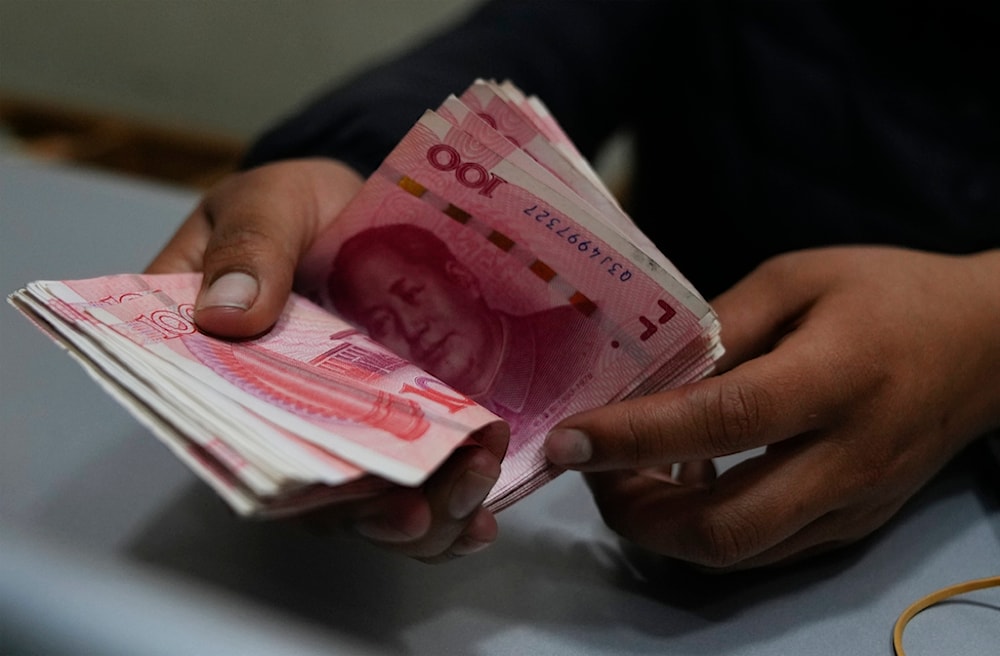China to monitor external environment to stabilize yuan
China's foreign exchange regulator, Zhu Hexin, head of the State Administration of Foreign Exchange (SAFE), announced measures to closely monitor the external environment to prevent excessive fluctuations in the yuan exchange rate.
-

A money exchange shop worker counts Chinese yuan banknotes in La Paz, Bolivia, Wednesday, July 26, 2023. (AP)
China's foreign exchange regulator, Zhu Hexin, head of the State Administration of Foreign Exchange (SAFE), announced on Wednesday that it will closely monitor changes in the external environment to prevent excessive fluctuations in the yuan exchange rate and guard against risks from abnormal cross-border capital flows.
Zhu spoke during the annual Lujiazui Forum in Shanghai and asserted that China's forex market remains resilient.
This comes amid a growing rift between the US and China and as the economy maneuvers difficult circumstances.
China's 'unfair trade practices' hamper Sino-US economic ties: Yellen
At an event held in New York, on June 13, US Treasury Secretary Janet Yellen said that China's alleged "unfair trade practices" were impeding efforts to build solid Sino-US economic relationships.
In a speech delivered to the New York Economic Club, the treasury official said that China's practices — ranging from restrictive investment policies to alleged economic coercion — were breaching fair competition, warning, "If China continues on this path, I fear that its policies may interfere significantly with our efforts to build a healthy economic relationship."
Of particular concern were Beijing's "enduring macroeconomic imbalances," she said.
Yellen said that China stands out globally due to its exceptionally high saving rate, ranging from 45 to 50 percent of its gross domestic product over approximately two decades. This rate is double that of the average economy within the 38-member Organization for Economic Co-operation and Development (OECD), which comprises some of the world's most dynamic economies.
These elevated savings indicate a lack of adequate domestic consumption demand and pose the risk of expanding China's external surplus. This surplus is channelled into manufacturing, leading to overcapacity in specific industries with unusually high investment rates.
Yellen noted that this issue extends beyond China and has global implications, particularly affecting the US.
China's rapid growth cannot occur without causing displacement on a global scale, The secretary noted.
Consequently, China cannot expect the US and other nations to absorb large quantities of excess production without adversely affecting domestic industries in those countries, Yelen said.
"This overcapacity threatens American firms and workers, along with those around the world. We saw in the past how overcapacity can decimate businesses here at home," the Treasury secretary said. "We are now seeing the risks of that happening again, in key industries that matter to our long-term growth, such as electric vehicles, lithium-ion batteries, and solar, but also across a range of manufacturing industries."
Yellen noted the difficulty in accurately quantifying the extent of China's subsidies and industrial policies due to an alleged lack of transparency. "But even conservative estimates suggest that they far exceed that of other countries, which is why we see economies ranging from advanced to emerging markets launch trade investigations," she said.
Yellen cautioned that China's overcapacity poses a risk of artificially concentrating US supply chains, which could lead to additional security and economic concerns. "I have heard these concerns from American and foreign businesses," she added.
Yellen affirmed her commitment to persistently addressing her concerns with Beijing's leadership, and outlined the US' strategy of "friendshoring", which involves strengthening connections with various trusted partners and allies for the purposes of diversifying supply chains and foster the long-term growth of the US private sector.
Read more: US 15 years behind China in nuclear power development: Report

 4 Min Read
4 Min Read








